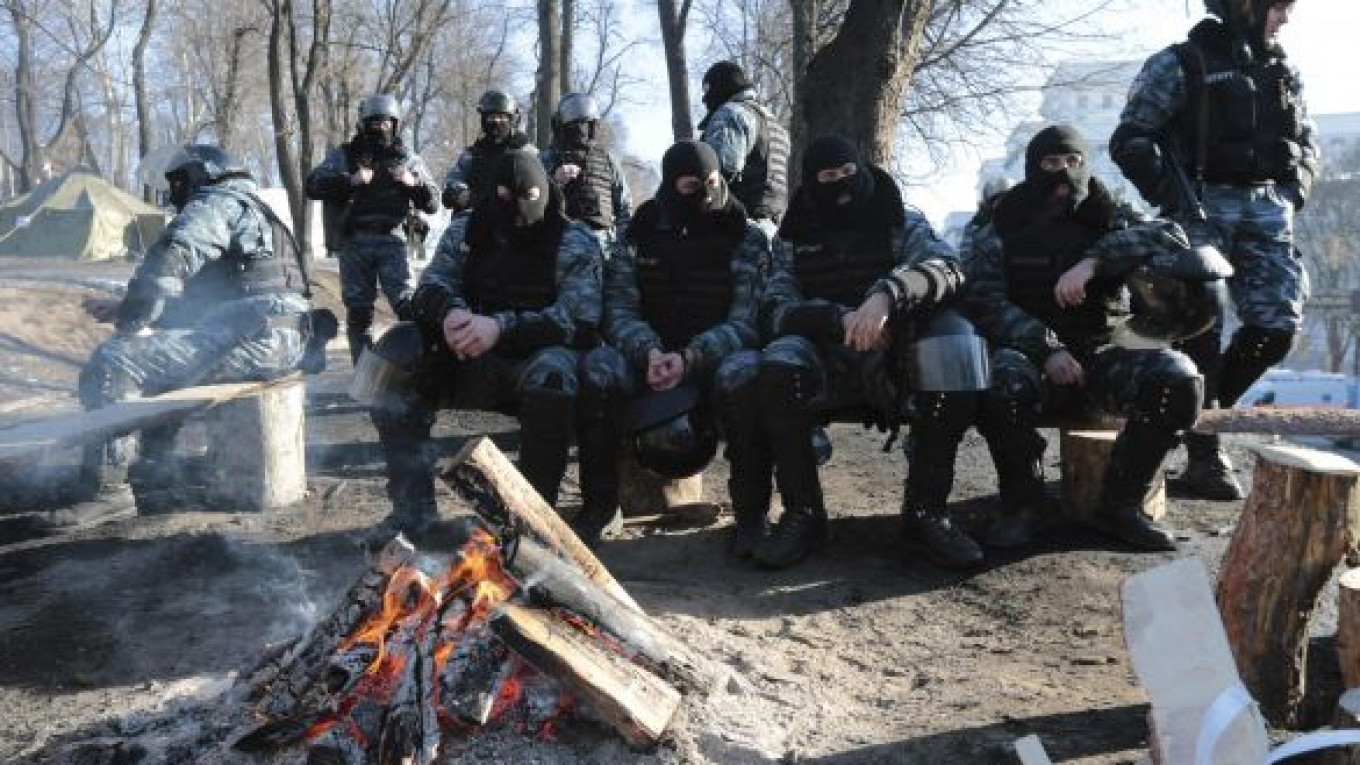KIEV — Ukraine's President Viktor Yanukovych, battling mass unrest against his rule, faced demands from the opposition on Tuesday for a constitutional change that would seriously curtail his powers.
Yanukovych was still weighing whom he might name as his new prime minister to calm the crisis on the streets — though rumours swirled that he could be considering a hardline ally who at the moment heads his administration.
As the Ukrainian central bank intervened again to stop panic demand for dollars weakening the hryvna currency, Ukraine sharply criticised European Union heavyweight Germany after comments by its foreign minister that sanctions should be used as a threat unless a political solution was found soon to end the crisis.
At least six people have been killed in the past two weeks in unprecedented politically linked violence in Kiev, whose centre is now a heavily barricaded fortified protest zone.
Fierce clashes between riot police and squads of radical protesters have prompted global concern that the ex-Soviet republic, a substantial buffer territory of 46 million people between Russia and the EU, might plunge into civil war.
Though there has been no violence in Kiev for several days, Western governments have warned Yanukovych that it risks flaring up again unless he can find a compromise with the opposition.
Yanukovych triggered the uprising on the streets last November when he walked away from a trade deal with the EU in favour of closer economic ties with Russia.
Though his move was rewarded with a $15-billion offer of credits and cheap gas from Moscow for Ukraine's ailing economy, it provoked outrage among millions of Ukrainians who dream of a European future for their country.
Caught in a geopolitical tug-of-war between Russia and the West, Yanukovych faces tough choices over his future alliances.
The U.S. and its EU allies are backing the protesters, though largely with words rather than deeds or cash. President Vladimir Putin's hefty economic lifeline comes with a condition that Yanukovych forms a government that suits Moscow.
Ukraine quickly reacted after German Foreign Minister Frank-Walter Steinmeier raised the issue of sanctions.
The foreign ministry called in Berlin's ambassador to Kiev and said later in a statement: "It was emphasised that there was a need for an objective assessment of the development of the internal political processes of the situation in our state and that provocative statements should be avoided."
Yanukovych, according to reported comments by a political ally, has said he will not use force to clear the streets, where hundreds of protesters are camped out on Independence Square or in occupied municipal buildings.
The opposition, buoyed by Western expressions of support, pressed on Tuesday in parliament for a return to a previous constitution which would mean Yanukovych losing some of the key powers he has accumulated since being elected in 2010.
These include appointing the prime minister and entire government as well as regional governors.
The opposition also wants an unconditional amnesty for protesters detained in the unrest to be broadened into an unconditional pardon for all those being held by police.
"One of the ways out is the redistribution of powers held by the authorities. After that we can be more certain of changes in the country," said boxer-turned-politician Vitaly Klitschko, one of the main opposition leaders.
"We have to make swift changes and return to the 2004 constitution in order to even out the powers of the president," said far-right nationalist leader Oleh Tyahnibok.
Analysts say any return to the 2004 constitution — something which the pro-Yanukovych majority in parliament seems unlikely to allow — would automatically mean an early presidential election, another key demand of the opposition.
A leading lawmaker from Yanukovych's Party of the Regions said that the president had told his allies he would not declare a state of emergency or use troops or other force to clear central Kiev's protest zone, according to local media late on Monday.
"We have the capacity to free administrative premises and even the Maidan (main square) by force," Yanukovych was quoted as saying by lawmaker Yuri Miroshnichenko. "I will never do that because these are also our citizens."
It is unclear what options Yanukovych now has. His office said he was preparing to go to Sochi in Russia to attend the opening of the Winter Olympics later this week — a visit which could provide a chance for further talks with Putin.
Russia has released $3 billion of the promised $15 billion lifeline, but Putin has since hinted there may be no more coming until Moscow sees the colour of the next Ukrainian government.
The subtext seems to be that Moscow will keep the credits from coming on-stream if Yanukovych brings in a government that will tilt policy back towards the West.
Yanukovych has yet to appoint a successor to Russian-born hardliner Mykola Azarov, who stepped down as premier on Jan. 28.
A Message from The Moscow Times:
Dear readers,
We are facing unprecedented challenges. Russia's Prosecutor General's Office has designated The Moscow Times as an "undesirable" organization, criminalizing our work and putting our staff at risk of prosecution. This follows our earlier unjust labeling as a "foreign agent."
These actions are direct attempts to silence independent journalism in Russia. The authorities claim our work "discredits the decisions of the Russian leadership." We see things differently: we strive to provide accurate, unbiased reporting on Russia.
We, the journalists of The Moscow Times, refuse to be silenced. But to continue our work, we need your help.
Your support, no matter how small, makes a world of difference. If you can, please support us monthly starting from just $2. It's quick to set up, and every contribution makes a significant impact.
By supporting The Moscow Times, you're defending open, independent journalism in the face of repression. Thank you for standing with us.
Remind me later.






